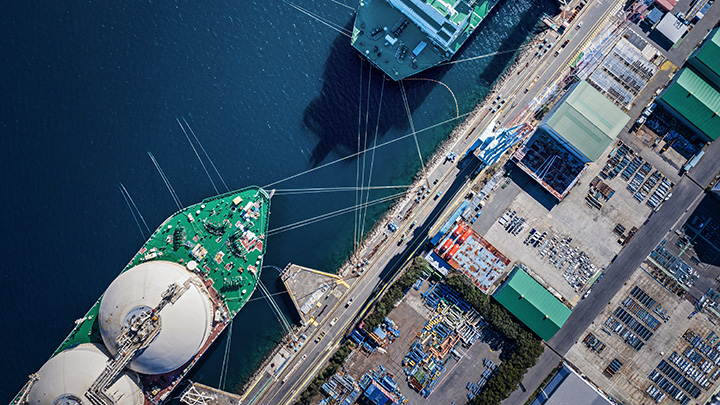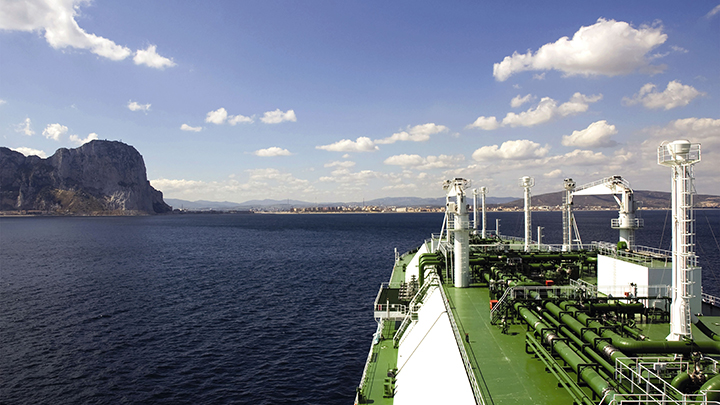Stay on course with MAN four-stroke engines powered by LNG
Methane slip negatively impacts the climate benefits of LNG as an energy source. MAN Energy Solutions is committed to minimizing methane slip, thereby significantly extending the life cycle of MAN engines and gensets. To achieve this goal, MAN four-stroke engines are already future-proof with dual-fuel capabilities. As we optimize our engines to make methane slip negligible, we offer several pathways to decarbonization as we are moving big things to zero.

Addressing methane slip in LNG shipping
As a shipping fuel, LNG offers numerous advantages for both ship operators and the environment. Its high energy content and low carbon emissions significantly reduce greenhouse gas (GHG) emissions. Furthermore, its minimal sulfur content contributes to
emissions of particulate matter (PM) and sulfur oxides (SOx), which is crucial for compliance with industry regulations set forth by the International Maritime Organization (IMO) and other organizations.
However, addressing the climate
risks associated with methane slip is essential, especially in light of evolving regulations concerning LNG use. Methane slip refers to the release of small yet significant amounts of unburnt methane (CH4) into the atmosphere during combustion. Given
methane's potent impact as a greenhouse gas, surpassing that of CO2 significantly, we must pay close attention to this issue and work diligently to mitigate its effects following regulatory requirements.
Taking up the challenge
We are actively pursuing effective solutions in the realm of four-stroke dual fuel (DF) engines. With our four-stroke gas-burning engines that employ the Otto combustion process, we have reduced methane slip by 50% over the past decade. The 20-year global warming potential (GWP) of our modern DF engines improves the carbon footprint compared to conventional diesel, the 100-year GWP marks a massive improvement, ensuring LNG is a viable fuel solution for long-term ship operation. These environmental benefits are not only evident in the short term but are particularly advantageous for the long run. Our dedicated engineers are actively exploring innovative solutions to further minimize methane slip from both four-stroke and two-stroke gas-burning engines in the years ahead.

With the MAN 49/60DF and its advanced methane slip reduction features, we offer an optimal solution for reducing GHG emissions today and paving the way for a sustainable future.

How MAN Energy Solutions addresses methane slip
As we tackle the challenge of methane slip head-on, our engines incorporate a range of innovative solutions. In addition to optimizing the engine construction for reduced methane slip, we also optimize effective methane combustion. Moreover, our ongoing efforts include the development of a new oxidation catalyst, with the aim of achieving a further 70% reduction in methane slip.
MAN engine innovation
Related news
-
Monday, November 20, 2023
New Project Aims to Significantly Reduce Four-Stroke Methane Slip
IMOKAT II oxidation-catalyst project aims for 70% reduction in methane slip -
Monday, July 17, 2023
‘ME-GA-opti’ Optimises Combustion Onboard LNG Carrier Newbuilding
Innovative feature delivers optimal running during gas trials through individual cylinder control on ME-GA-powered LNG carrier -
Monday, September 26, 2022
MAN Energy Solutions and ABB to Cooperate on Dual-Fuel Electric Propulsion Concept for Next-Generation FSRUs and LNG Carriers
SMM agreement covers development of next-generation ‘DFE+’ decarbonisation solutions based on new MAN 49/60DF engine and ABB’s Dynamic AC power distribution and control system -
Tuesday, November 26, 2019
LNG-Fuelled Propulsion Solution Heralds New Green Era for VW Car Carriers
Chinese naming ceremony for Siem PCTCs with MAN Energy Solution engines, turbochargers and propellers
Connect with MAN experts
Connect with MAN experts to gain valuable insights and explore solutions for how to effectively manage methane slip. Explore the environmental impacts of methane slip in engines and gensets. Our industry experts will share their tailored products and practical solutions to minimize methane emissions.
Continue reading
-

Can methane slip be controlled
MAN Energy Solutions expert Gunnar Stiesch tells us how we can reduce methane slip in two-stroke and four-stroke engines for cleaner shipping with LNG.
-

LNG
LNG stands for liquefied natural gas, natural gas transformed into a liquid state through a cooling process. In its liquid form, natural gas has a significantly smaller volume for export, shipping, and storage. It is a low-emission, clean-burning fossil fuel that can be used for marine propulsion and transportation and regasified after delivery to a terminal.
MAN Energy Solutions is now Everllence.
We have adopted a new brand name and moved to a new domain: www.everllence.com. This page will also be relocated there shortly. We are working on shifting all pages to www.everllence.com.
